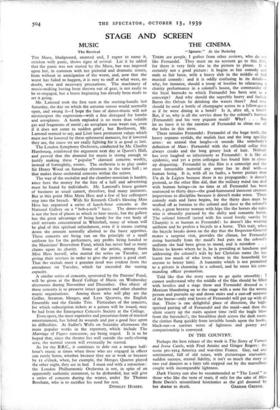STAGE AND SCREEN
MUSIC
The Revival THE Muse, bludgeoned, stunned and, I regret to name it, stricken with panic, shows signs of revival. Let it be added that the panic was not started by the Muse, but was imposed upon her, in common with her pictorial and dramatic sisters, from without in anticipation of the worst, and, now that the worst has failed to happen, it is easy to sniff at what were, no doubt, wise and necessary precautions. The machinery of music-making having been thrown out of gear, is not easily to be re-engaged, but a brave beginning has already been made to set it going.
Mr. Lamond took the first turn at the starting-handle last Saturday, the day on which the autumn season would normally open, and swung it—I hope the fans of dance-music will not misinterpret the expression—with a fine disregard for bombs and aeroplanes. A bomb exploded is no more than volatile gas and fragments of metal ; an aeroplane soon wears out, even if it does not come to sudden grief ; but Beethoven, Mr. Lamond seemed to say, and Liszt have permanent values which must not be lowered by these ephemeral menaces, for if lowered they are, the cause we are really fighting for is as good as lost.
The London Symphony Orchestra, conducted by Mr. Charles Hambourg, reinforced the argument next day at Queen's Hall, and proved that the demand for music is strong enough to justify making these " popular " classical concerts weekly, instead of fortnightly, events. The orchestra is to play under Sir Henry Wood on Saturday afternoon in the same hall ; so that makes three orchestral concerts within the octave.
The way of the recitalist and the chamber-musician is harder, since here the money for the hire of a hall and advertising must be found by individuals. Mr. Lamond's brave gesture of business as usual cannot, therefore, find many imitators. But at this point Miss Myra Hess and a few of her colleagues step into the breach. With Sir Kenneth Clark's blessing Miss Hess has organised a series of lunch-hour concerts at the National Gallery on a " bob-a-nob " basis. The dome-room is not the best of places in which to hear music, but the gallery has the great advantage of being handy for the vast body of civil servants concentrated in Whitehall, many of whom will be glad of this spiritual refreshment, even if it means cutting down the amount normally allotted to the baser appetites. These concerts are being run on the principle of a small uniform fee for the performers, any profits being handed to the Musicians' Benevolent Fund, which has never had so many claims upon its charity. Some of the artists, among them Miss Hess herself, who started the series on Tuesday, are giving their services in order to give the project a good start. That the recitals meet a genuine need was evident from the attendance on Tuesday, which far exceeded the seating capacity.
A similar series of concerts, sponsored by the Patrons' Fund, will be given at the Royal College of Music on Wednesday afternoons during November and December. One object of these concerts is to preserve intact quartets and other chamber music organisations. Among those who will play are the Griller, Stratton, Menges, and Lyra Quartets, the English Ensemble and the Grinke Trio. Particulars of the concerts, for which subscription tickets at a guinea will be issued, may be had from the Emergency Concerts Society at the College.
Even opera, the most expensive and precarious form of musical entertainment, has licked its wounds and put a good face upon its difficulties. At Sadler's Wells on Saturday afternoons the more popular works in the repertory, which include The Marriage of Figaro tomorrow, are being staged. It is to be hoped that, since the theatre lies well outside the early-closing area, the normal season will eventually be started.
As for the B.B.C., it continues to dole out a meagre half- hour's music at times when those who are engaged in offices can rarely listen, whether because they are at work or because by t t o'clock, when, for example, the Menges Quartet played the other night, they are in bed. I must end with a retraction : the London Philharmonic Orchestra is not, in spite of an apparently authentic statement, to be disbanded, but will give a series of concerts during the winter, under Sir Thomas Beecham, who is to sacrifice his need for rest.
DYNELEY HUSSEY.










































 Previous page
Previous page